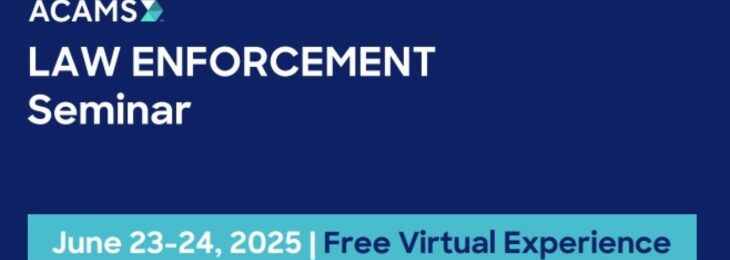
I thought I had finished writing articles about the effects of the pandemic on work and the employment market. I discussed working from home, returning to the office, the growth of fintech and the renaissance of digital banking and how the new normal would look. But it is time to speak about one of the most interesting and scandalous byproducts of the COVID-19 pandemic: The fraudulent candidate. I have been in the recruiting field for 15 years and have spoken to tens of thousands of people about their job searches and careers. By the nature of the law of averages, I have come across candidates who are trying to dupe me by embellishing credentials, lying about previous employers and pretending to be anti-money laundering (AML) and compliance professionals to land their next gig.
Up until the pandemic, 99.9% of the time, I unearthed their schemes before they received offers, started jobs with my clients and damaged my relationships and reputation. But now, I must face a harsh reality: My streak has ended. I have been duped. More than once, unfortunately. The silver lining—selfishly speaking—is that I am not the only one to fall victim to fraudsters. Every day, I speak to more and more managers and supervisors who have their own stories about hiring “strong” candidates for their jobs, only to discover that they were played. In some cases, they discover that the person they hired is different from the person they interviewed. The pandemic had many effects on the way we work, how we view work, where we work from, how we communicate with our colleagues and how we interview candidates.
As you know, as a compliance and financial crimes professional, change and chaos bring opportunities for fraud. The pandemic and the job market are no different. Fraud is always a possibility when you put a buyer (the hiring manager) and a seller (the candidate) together. With the benefit of hindsight, it is easy to see how the upheaval we experienced in 2020 created the perfect opportunity for fraudsters to fake their way into jobs they were not qualified for and create a whole new level of distrust of candidates with which we are still dealing.
I want to be clear: Most people on the job market are real, honest, hardworking and qualified. The phenomenon I am discussing here is fascinating because of the relative increase in candidate fraud that occurred after we started sheltering at home, working from home and interviewing candidates virtually. The quick, sudden and drastic changes we experienced in March 2020 created a great (a euphemism) environment for pirates and fraudsters to take advantage of employers. And to be candid, the phenomenon is not as prevalent now as it was in 2020 and 2021. However, that is because we were fighting the battle to prevent candidate fraud behind the scenes. I will explain how.
The Incidences
Here are a few remarkable stories I have heard about pirate candidates and have experienced personally:
A hiring manager friend of mine at an advisory firm hired a contractor to help with AML work on a full-time basis. However, the contractor kept taking Thursdays off and giving dramatic excuses for his consistent absences. Then one week, the hiring manager went to a happy hour with another banking client only to find that the contractor was a full-time employee at that bank!
A cryptocurrency company hired an advisory firm to help with an AML remediation. The advisory firm hired several contractors to help. One contractor was having a hard time logging into her computer during training, so she asked IT for help. IT was surprised because their systems said she was logged in and working. The IT department investigated only to find that she had two sets of credentials and two computers. After further digging, they discovered she had engaged with two different staffing agencies working on the same project. She could only log in to one computer at a time! She was attempting to double dip to increase her wages. It is safe to say that she had to return both computers immediately.
On a few occasions, unfortunately, we interviewed, vetted and presented strong candidates to roles only for a totally different person to show up to the actual interview with the hiring manager! Now, do not ask me what the point of that is, but it happened more than common sense expects.
The Effects
Why does the pirate candidate phenomenon matter in the grand scheme of things? They make for great cocktail stories, and we know most candidates are honest and forthcoming.
It matters because it prevents work from getting done well, which is costly. What is more costly than getting work done? Having to do the work all over again. Many projects took longer to complete because the work of pirates had to be identified, quality assured and redone. Even pirates must get paid. By law, anyone that provides labor must get paid (and they should), and companies were paying the pirates and then those who came in to clean up the mess. On top of that, you have lost time from redoing the interview and onboarding processes.
It matters because qualified candidates are losing opportunities. Many good people lost their jobs and income in 2020. Jobs and projects slowly came back in 2021, which was when pirating reached its apex. Many qualified candidates lost opportunities, new jobs and steps in their careers because fake candidates and fraudsters stole them.
It matters because vendors lose business and hiring managers lose trust. I was lucky enough not to lose business and clients from these incidences, but I did have explaining and damage control to do. However, other staffing vendors did lose business. Recruiters and staffing agencies had a part to play in all of this, but they were victims in this, too.
On a few occasions, unfortunately, we interviewed, vetted and presented strong candidates to roles only for a totally different person to show up to the actual interview with the hiring manager
Lastly, hiring managers and supervisors had to spend more time vetting the work of their staff because they were trying to prevent low-quality work and delays before it caused too much damage. That could have been time and effort spent on more productive tasks.
The Quick Fix
The incidence of fraud had increased so much that we had to implement a whole new screening system to filter out the bad apples. We had to use Zoom and video interviews to our advantage. We started:
- Asking candidates to give us 360-degree views of their interviewing space.
- Asking candidates to prove their identities.
- Implementing protocols so we could be diligent in making sure candidates were not taking cues from third parties in the vicinity through social apps, instant messaging and texts.
- Joining video interviews—before they started—with both the candidate and hiring manager on the call so we could confirm the candidate was the candidate we presented for the role (which you read about earlier).
Words of Wisdom
This is not a typical career guidance column, and I will not treat it like one. I might not leave you with words of wisdom or advice that you can use to further your career. What I can do is make a request as a recruiting professional, a hiring manager and just a plain human being. Let us fight the pirates who have infiltrated our community, prevented hardworking folks from getting positions and made supervisors’ lives tougher.
If you are a candidate:
- Keep your LinkedIn profile as up to date as possible. Your LinkedIn page should always reflect the information that is on your resume. Personally, we stalk people on social media to see how real they are. The same goes for the professional world. You want to make sure that what hiring managers see on your resume, they see on professional social media. The last thing you want is to be second-guessed just because of discrepancies between the two. That is the world in which we live. Plus, a solid LinkedIn page can passively work wonders for your career and job search.
- Be prepared for stringent vetting processes in the future. The process we use at my company that I described earlier will become more common in the future. Let us hope it does not become the norm.
- Be honest. I know that it is asinine to write, but it is so important. Do not lie about your qualifications, where you worked, how long you worked there, etc. And be candid about potential flags before background checks start. You will always get caught. It could be sooner. It could be later. But it always ends up being a waste of time for all parties involved.
- If you are a consultant, please do not work on more than one full-time project at once. If you do, please be open with all parties that your attention is spread across different engagements. It is tough enough to do high-quality work on one task at a time. Imagine having to multitask and hide your activity at the same time. You will get caught and lose all your engagements and possibly your reputation.
If you are a hiring manager:
- Learn what your human resources department’s vetting process entails. In addition, find out the vetting process of your company’s recruiting partners and background check vendors. You will be able to spot possible weak points where pirate candidates have been able to trick and manipulate the system. Work with your partners to plug those holes. Or, if it is out of your control, you can at least be more stringent during the interview process.
- If you hire consultants and contingent labor for remediations or business-as-usual work, be ready for pirates. Again, ask your staffing partners how they filter out fake candidates, prevent contractors from working on multiple projects at the same time and qualify their candidates. You will never evade the pirates 100% of the time, but you can minimize the risk and heartache by being aware of your partners’ processes and holding them accountable when the pirates are successful.
I hope this does not become the first of a series of articles. I really do not want to have to write a sequel to this piece because the phenomenon evolved. I am writing this more from a perspective of fascination than anything else. The lessons to be learned are not new, unfortunately, but they are worth being repeated. Be diligent, wary and aware. Fraud is not always financial in nature. It comes in many forms.
Sanjeev Menon, ACAMS Career Guidance columnist, compliance, legal and privacy senior practice area manager, Korn Ferry, New York, NY, USA, Sanjeev.Menon@KornFerry.com











Excellent article and a reminder that even minimal scrutiny will expose most frauds. When we are too mission or goal focused to do even that, our doors open up to these frauds with both their civil and criminal consequences.